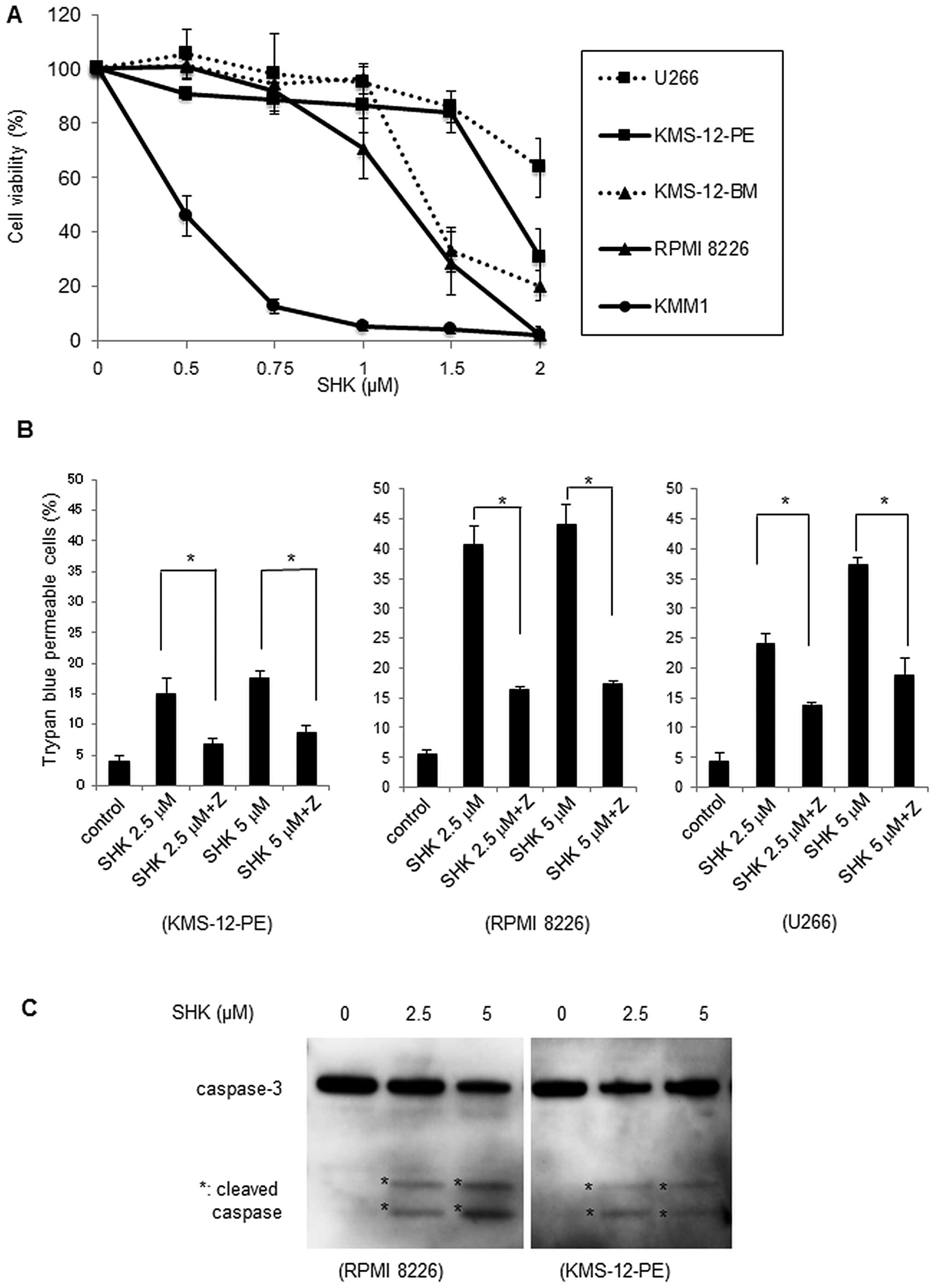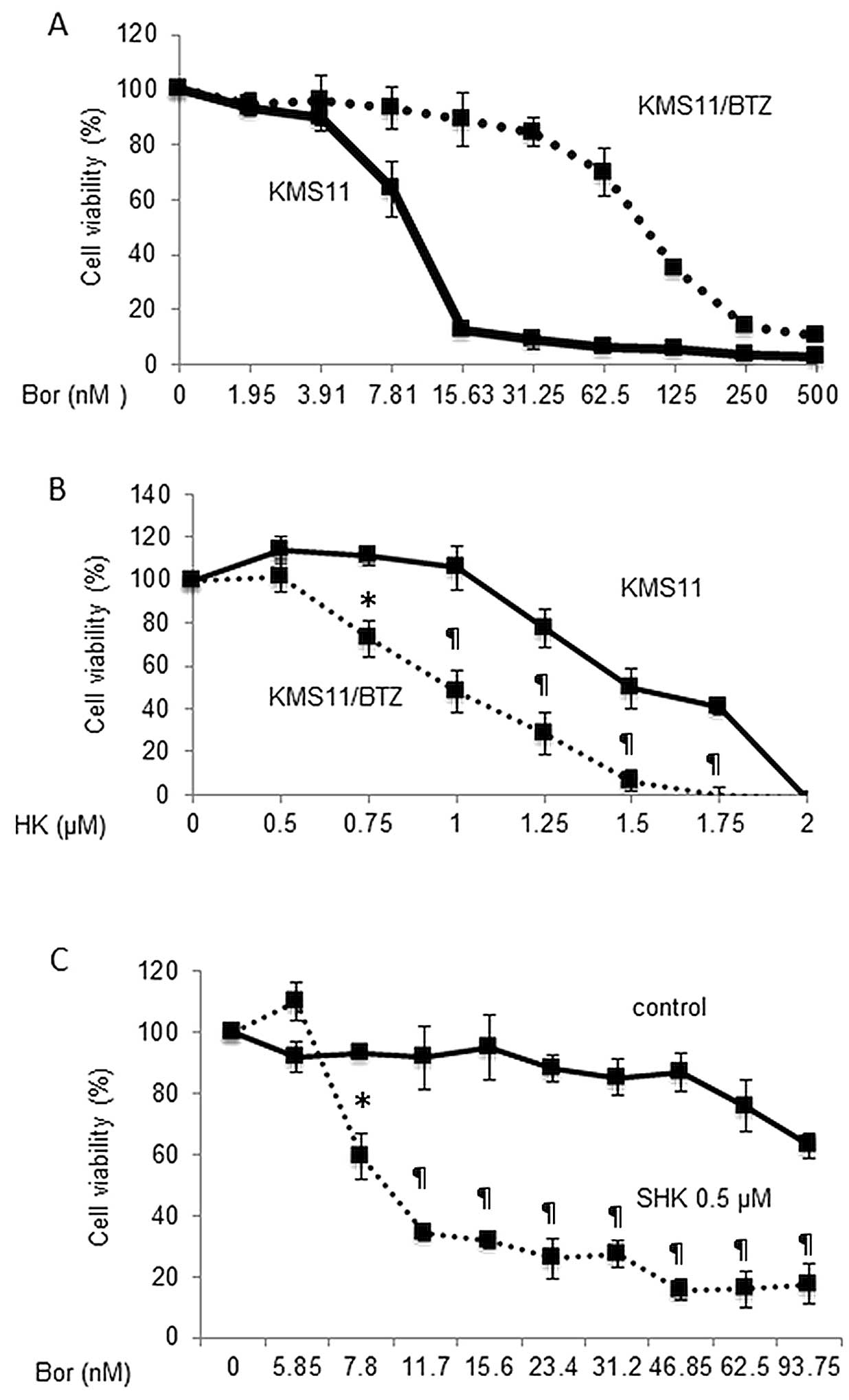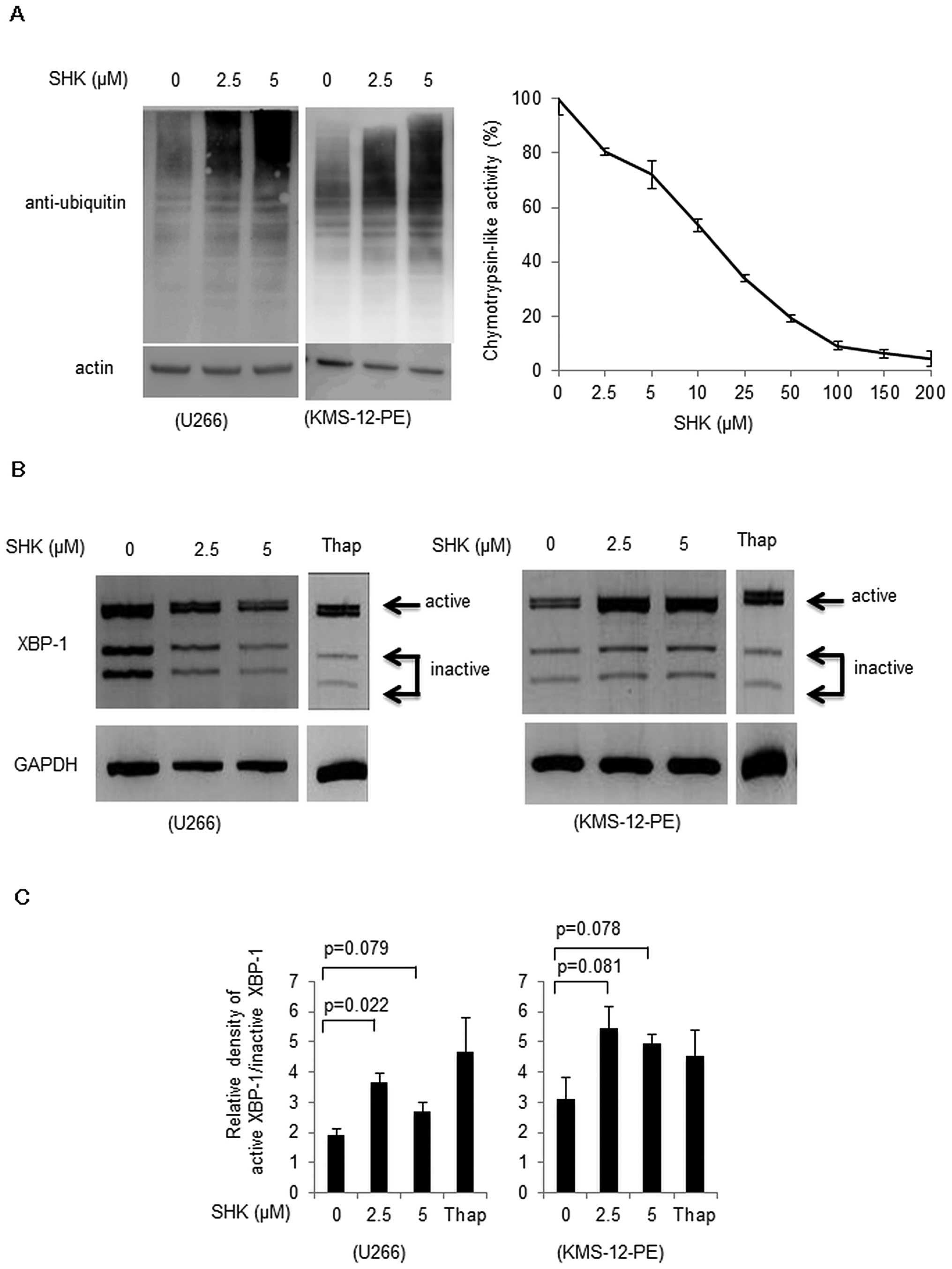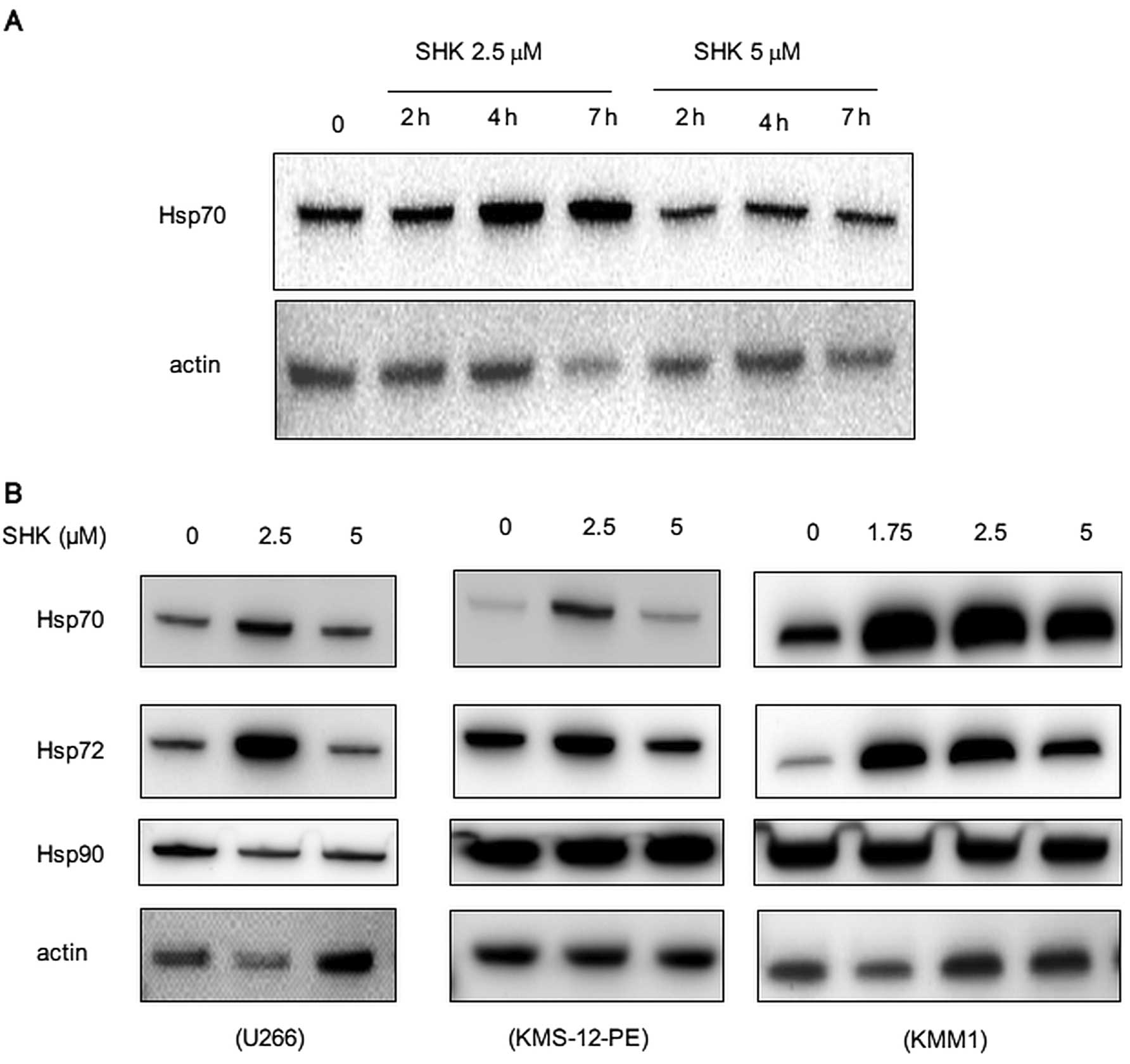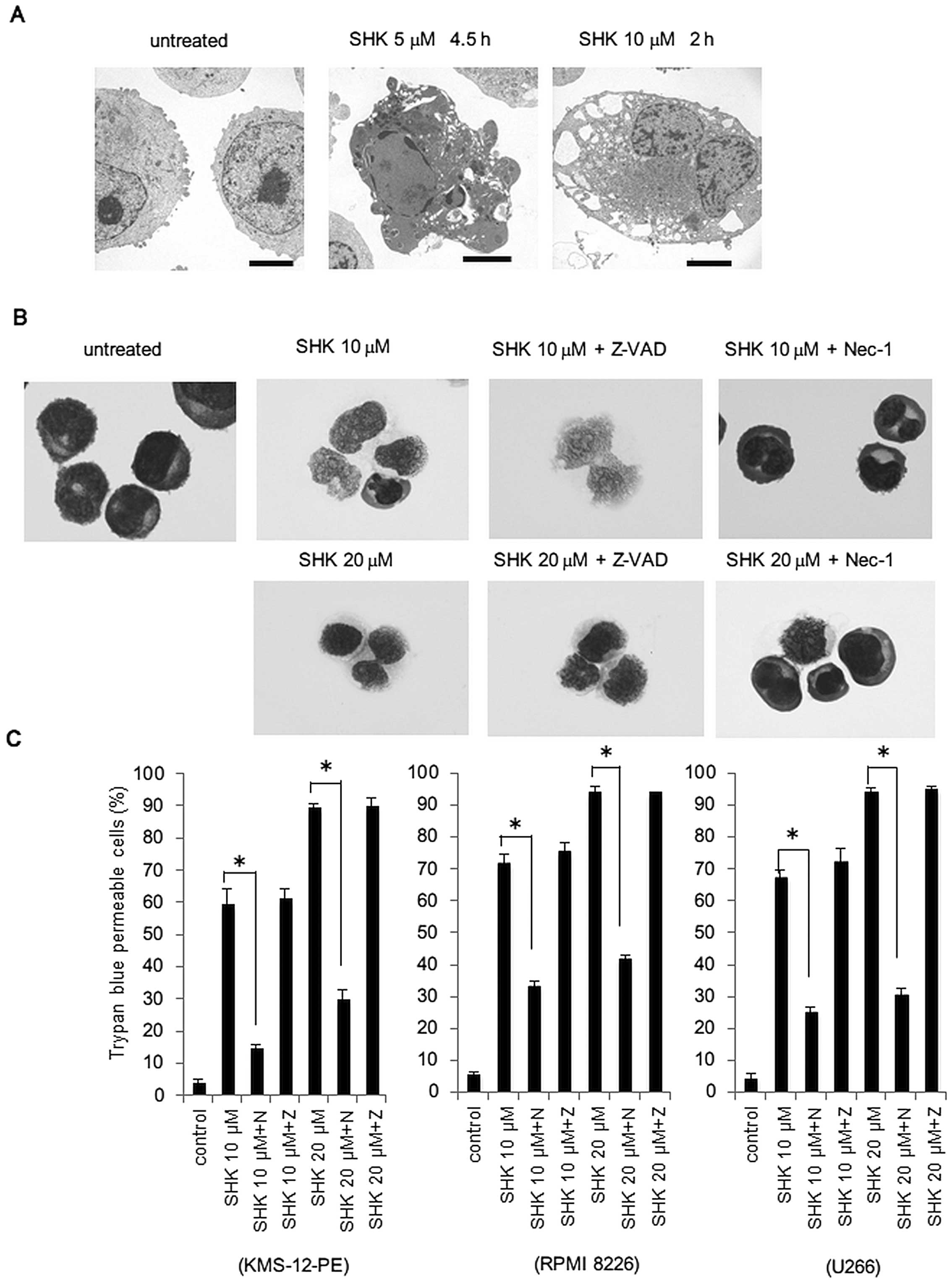|
1
|
Palumbo A and Anderson K: Multiple
myeloma. N Engl J Med. 364:1046–1060. 2011. View Article : Google Scholar : PubMed/NCBI
|
|
2
|
He S, Liao TT, Chen YT, Kuo HM and Lin YL:
Glutathione-S-transferase enhances proliferation-migration and
protects against shikonin-induced cell death in breast cancer
cells. Kaohsiung J Med Sci. 27:477–484. 2011. View Article : Google Scholar : PubMed/NCBI
|
|
3
|
Duan D, Zhang B, Yao J, Liu Y and Fang J:
Shikonin targets cytosolic thioredoxin reductase to induce
ROS-mediated apoptosis in human promyelocytic leukemia HL-60 cells.
Free Radic Biol Med. 70:182–193. 2014. View Article : Google Scholar : PubMed/NCBI
|
|
4
|
Yoon Y, Kim YO, Lim NY, Jeon WK and Sung
HJ: Shikonin, an ingredient of Lithospermum erythrorhizon induced
apoptosis in HL60 human premyelocytic leukemia cell line. Planta
Med. 65:532–535. 1999. View Article : Google Scholar : PubMed/NCBI
|
|
5
|
Mao X, Yu CR, Li WH and Li WX: Induction
of apoptosis by shikonin through a ROS/JNK-mediated process in
Bcr/Abl-positive chronic myelogenous leukemia (CML) cells. Cell
Res. 18:879–888. 2008. View Article : Google Scholar : PubMed/NCBI
|
|
6
|
Jang SY, Jang EH, Jeong SY and Kim JH:
Shikonin inhibits the growth of human prostate cancer cells via
modulation of the androgen receptor. Int J Oncol. 44:1455–1460.
2014.PubMed/NCBI
|
|
7
|
Hsu PC, Huang YT, Tsai ML, Wang YJ, Lin JK
and Pan MH: Induction of apoptosis by shikonin through coordinative
modulation of the Bcl-2 family, p27, and p53, release of cytochrome
c, and sequential activation of caspases in human colorectal
carcinoma cells. J Agric Food Chem. 52:6330–6337. 2004. View Article : Google Scholar : PubMed/NCBI
|
|
8
|
Chen CH, Lin ML, Ong PL and Yang JT: Novel
multiple apoptotic mechanism of shikonin in human glioma cells. Ann
Surg Oncol. 19:3097–3106. 2012. View Article : Google Scholar : PubMed/NCBI
|
|
9
|
Ahn J, Won M, Choi JH, et al: Reactive
oxygen species-mediated activation of the Akt/ASK1/p38 signaling
cascade and p21(Cip1) downregulation are required for
shikonin-induced apoptosis. Apoptosis. 18:870–881. 2013. View Article : Google Scholar : PubMed/NCBI
|
|
10
|
Min R, Tong J, Wenjun Y, et al: Growth
inhibition and induction of apoptosis in human oral squamous cell
carcinoma Tca-8113 cell lines by Shikonin was partly through the
inactivation of NF-kappaB pathway. Phytother Res. 22:407–415. 2008.
View Article : Google Scholar : PubMed/NCBI
|
|
11
|
Yang H, Zhou P, Huang H, et al: Shikonin
exerts antitumor activity via proteasome inhibition and cell death
induction in vitro and in vivo. Int J Cancer. 124:2450–2459. 2009.
View Article : Google Scholar : PubMed/NCBI
|
|
12
|
Zhang FL, Wang P, Liu YH, et al:
Topoisomerase I inhibitors, shikonin and topotecan, inhibit growth
and induce apoptosis of glioma cells and glioma stem cells. PLoS
One. 8:e818152013. View Article : Google Scholar : PubMed/NCBI
|
|
13
|
Ahmed K, Furusawa Y, Tabuchi Y, et al:
Chemical inducers of heat shock proteins derived from medicinal
plants and cytoprotective genes response. Int J Hyperthermia.
28:1–8. 2012. View Article : Google Scholar : PubMed/NCBI
|
|
14
|
Eremenko EM, Antimonova OI, Shekalova OG,
Polonik SG, Margulis BA and Guzhova IV: Novel compounds increasing
chaperone Hsp70 expression and their biological activity.
Tsitologiia. 52:235–241. 2010.(In Russian).
|
|
15
|
Munshi NC, Hideshima T, Carrasco D, et al:
Identification of genes modulated in multiple myeloma using
genetically identical twin samples. Blood. 103:1799–1806. 2004.
View Article : Google Scholar
|
|
16
|
Nimmanapalli R, Gerbino E, Dalton WS,
Gandhi V and Alsina M: HSP70 inhibition reverses cell adhesion
mediated and acquired drug resistance in multiple myeloma. Br J
Haematol. 142:551–561. 2008. View Article : Google Scholar : PubMed/NCBI
|
|
17
|
Chatterjee M, Andrulis M, Stuhmer T, et
al: The PI3K/Akt signaling pathway regulates the expression of
Hsp70, which critically contributes to Hsp90-chaperone function and
tumor cell survival in multiple myeloma. Haematologica.
98:1132–1141. 2013. View Article : Google Scholar :
|
|
18
|
Fu Z, Deng B, Liao Y, et al: The
anti-tumor effect of shikonin on osteosarcoma by inducing RIP1 and
RIP3 dependent necroptosis. BMC Cancer. 13:5802013. View Article : Google Scholar : PubMed/NCBI
|
|
19
|
Huang C, Luo Y, Zhao J, et al: Shikonin
kills glioma cells through necroptosis mediated by RIP-1. PLoS One.
8:e663262013. View Article : Google Scholar : PubMed/NCBI
|
|
20
|
Degterev A, Huang Z, Boyce M, et al:
Chemical inhibitor of nonapoptotic cell death with therapeutic
potential for ischemic brain injury. Nat Chem Biol. 1:112–119.
2005. View Article : Google Scholar
|
|
21
|
Hitomi J, Christofferson DE, Ng A, et al:
Identification of a molecular signaling network that regulates a
cellular necrotic cell death pathway. Cell. 135:1311–1323. 2008.
View Article : Google Scholar : PubMed/NCBI
|
|
22
|
Degterev A, Hitomi J, Germscheid M, et al:
Identification of RIP1 kinase as a specific cellular target of
necrostatins. Nat Chem Biol. 4:313–321. 2008. View Article : Google Scholar : PubMed/NCBI
|
|
23
|
Cai Z, Jitkaew S, Zhao J, et al: Plasma
membrane translocation of trimerized MLKL protein is required for
TNF-induced necroptosis. Nat Cell Biol. 16:55–65. 2014. View Article : Google Scholar
|
|
24
|
Gunther C, Martini E, Wittkopf N, et al:
Caspase-8 regulates TNF-alpha-induced epithelial necroptosis and
terminal ileitis. Nature. 477:335–339. 2011. View Article : Google Scholar
|
|
25
|
Sawai H and Domae N: Discrimination
between primary necrosis and apoptosis by necrostatin-1 in Annexin
V-positive/propidium iodide-negative cells. Biochem Biophys Res
Commun. 411:569–573. 2011. View Article : Google Scholar : PubMed/NCBI
|
|
26
|
Chromik J, Safferthal C, Serve H and Fulda
S: Smac mimetic primes apoptosis-resistant acute myeloid leukaemia
cells for cytarabine-induced cell death by triggering necroptosis.
Cancer Lett. 344:101–109. 2014. View Article : Google Scholar
|
|
27
|
Ohtsuki T, Yawata Y, Wada H, Sugihara T,
Mori M and Namba M: Two human myeloma cell lines, amylase-producing
KMS-12-PE and amylase-non-producing KMS-12-BM, were established
from a patient, having the same chromosome marker,
t(11;14)(q13;q32). Br J Haematol. 73:199–204. 1989. View Article : Google Scholar : PubMed/NCBI
|
|
28
|
Matsuoka Y, Moore GE, Yagi Y and Pressman
D: Production of free light chains of immunoglobulin by a
hematopoietic cell line derived from a patient with multiple
myeloma. Proc Soc Exp Biol Med. 125:1246–1250. 1967. View Article : Google Scholar : PubMed/NCBI
|
|
29
|
Togawa A, Inoue N, Miyamoto K, Hyodo H and
Namba M: Establishment and characterization of a human myeloma cell
line (KMM-1). Int J Cancer. 29:495–500. 1982. View Article : Google Scholar : PubMed/NCBI
|
|
30
|
Ikeyama S, Nakagawa S, Arakawa M, Sugino H
and Kakinuma A: Purification and characterization of IgE produced
by human myeloma cell line, U266. Mol Immunol. 23:159–167. 1986.
View Article : Google Scholar : PubMed/NCBI
|
|
31
|
Namba M, Ohtsuki T, Mori M, et al:
Establishment of five human myeloma cell lines. In Vitro Cell Dev
Biol. 25:723–729. 1989. View Article : Google Scholar : PubMed/NCBI
|
|
32
|
Ri M, Iida S, Nakashima T, et al:
Bortezomib-resistant myeloma cell lines: a role for mutated PSMB5
in preventing the accumulation of unfolded proteins and fatal ER
stress. Leukemia. 24:1506–1512. 2010. View Article : Google Scholar : PubMed/NCBI
|
|
33
|
Uneda S, Hata H, Matsuno F, et al:
Macrophage inflammatory protein-1 alpha is produced by human
multiple myeloma (MM) cells and its expression correlates with bone
lesions in patients with MM. Br J Haematol. 120:53–55. 2003.
View Article : Google Scholar
|
|
34
|
Nakamura M, Gotoh T, Okuno Y, et al:
Activation of the endoplasmic reticulum stress pathway is
associated with survival of myeloma cells. Leuk Lymphoma.
47:531–539. 2006. View Article : Google Scholar : PubMed/NCBI
|
|
35
|
Tatetsu H, Ueno S, Hata H, et al:
Down-regulation of PU.1 by methylation of distal regulatory
elements and the promoter is required for myeloma cell growth.
Cancer Res. 67:5328–5336. 2007. View Article : Google Scholar : PubMed/NCBI
|
|
36
|
Chou TC: Drug combination studies and
their synergy quantification using the Chou-Talalay method. Cancer
Res. 70:440–446. 2010. View Article : Google Scholar : PubMed/NCBI
|
|
37
|
Zhang L, Fok JJ, Mirabella F, et al: Hsp70
inhibition induces myeloma cell death via the intracellular
accumulation of immunoglobulin and the generation of proteotoxic
stress. Cancer Lett. 339:49–59. 2013. View Article : Google Scholar : PubMed/NCBI
|
|
38
|
Garcia-Carbonero R, Carnero A and Paz-Ares
L: Inhibition of HSP90 molecular chaperones: moving into the
clinic. Lancet Oncol. 14:e358–369. 2013. View Article : Google Scholar : PubMed/NCBI
|
|
39
|
Christofferson DE and Yuan J: Necroptosis
as an alternative form of programmed cell death. Curr Opin Cell
Biol. 22:263–268. 2010. View Article : Google Scholar : PubMed/NCBI
|















